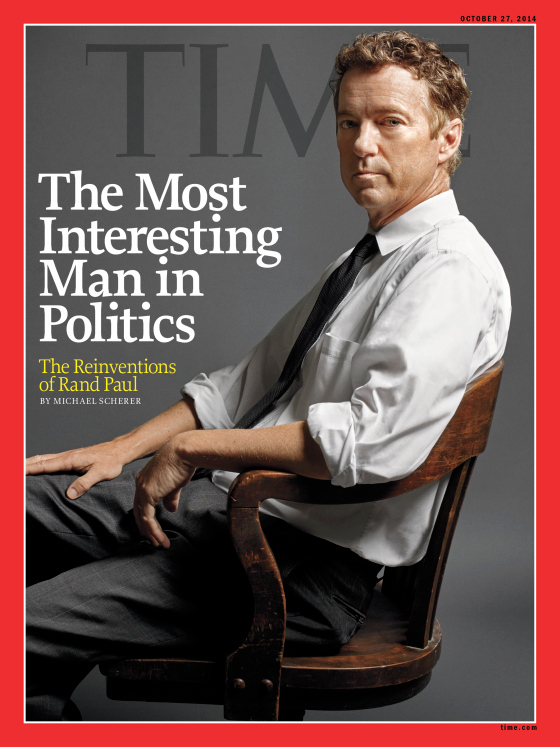
American presidential politics will not be having a libertarian moment after all. Sixteen months after Time magazine branded Republican Sen. Rand Paul (Kentucky) "The Most Interesting Man in Politics," Paul has suspended his campaign for the White House - due to lack of interest.
Paul got a mere 4.5 percent of the vote in the Iowa caucuses, underperforming his dad Ron Paul's 2012 result by 17 points. At the time he quit, Rand Paul was polling at about 2 percent in New Hampshire, the "Live Free or Die" state that was once thought to be receptive to his message.
What went wrong? The Paul phenomenon was always overblown. The theory, believed or at least entertained by a surprisingly large number of people, was that young voters and minorities could be attracted to the GOP by Paul's heterodox policy mix - free-market economics, drug-war relaxation, defense budget shrinkage and international nonintervention.
But this was hype, for three reasons: First, much of Paul's agenda could just as easily be offered by Democrats, and was. Second, as a messenger, the dour Paul managed to make freedom seem like it would be no fun.
Third, and most fundamentally, the American people, including many if not most GOP primary voters, do not really want small government. Or, to be more precise, their expressed concerns imply demand for greater government action, not less.
In the Pew Research Center's annual January survey of public concerns, only three issues both registered as "top priorities" among at least 50 percent of the public and increased their share of the responses over last year.
Those three issues were "defending the country from terrorism," "reducing crime" and "dealing with the issue of immigration." Forty-nine percent cited "strengthening the military," up eight points since the start of President Obama's second term.
Of course, Republicans were much more likely than Democrats to emphasize each of these issues; 87 percent of them cited fighting terrorism as a top priority, while only 32 percent cited Paul's signature issue, "criminal justice reform."
The era of Islamic State-organized or -inspired massacres in Paris and San Bernardino, California, was not a propitious period for a candidate who expressed some sympathy for National Security Agency leaker Edward Snowden and grandstanded on the Senate floor against the unlikely threat of domestic drone strikes.
Nor was Paul's soft-on-drugs stance perfectly in tune with the times. Legalization of marijuana may be gaining acceptance, but heroin and opioid addiction are causing middle-class angst across the nation. Polls show drug abuse is the top concern of voters in New Hampshire.
Yes, many agree with Paul that drug addiction treatment is a more appropriate response than law enforcement, but they may not trust an anti-government guy to organize and pay for it. In New Hampshire, 39 percent of Republicans and 50 percent of independents (who can vote in the GOP primary) said government should spend more to combat heroin.
If anything, the country may be experiencing a surge in big- government sentiment, with a vaguely authoritarian accent. Paul himself spotted this; his finest moments in the campaign came when he called out Donald Trump's dictatorial tendencies.
Anti-establishment primary voters in both parties say they're angry at government, but part of the reason they're angry at it, apparently, is that it's not using its muscle to protect them against various malefactors - illegal immigrants and terrorists for Republicans; Wall Street crooks and fossil-fuel companies for Democrats.
The only thing Trump and Sen. Bernie Sanders, I-Vermont, agree on, meanwhile, is that Social Security should be sacrosanct. Come to think of it, the young people of Iowa flocked to the Bern's socialist banner, not Rand's libertarian one.
What remains of libertarianism? Not nothing, perhaps. Less punitive attitudes toward drug use and even crime seem to have taken root, and Paul can plausibly claim to have helped make them mainstream.
More important, the public's demand for government action coexists with near-record-low levels of trust in Washington: just 19 percent, according to the latest Pew Research Center survey.
At its worst, as in the more paranoid ruminations of Paul père, libertarianism has given skepticism about the state a bad name.
At its best, however - the school choice movement, for example - libertarianism reminds us of the spontaneous wisdom of markets and the limits of bureaucratic competence.
If Americans expect more from government but don't trust it to deliver, one way to square that circle could be to apply more market-based thinking to how government carries out its various functions.
We may never get rid of big government, but we might subject it to structural reforms that incorporate libertarian ideas. At the very least, it would be interesting.
.
Comment by clicking here.


 Contact The Editor
Contact The Editor
 Articles By This Author
Articles By This Author
